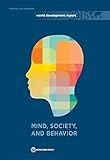World development report 2015: mind, behavior and development
Material type: TextPublication details: Washington, DC The World Bank 2015Description: 237pISBN:
TextPublication details: Washington, DC The World Bank 2015Description: 237pISBN: - 978-1-4648-0343-7
| Item type | Current library | Call number | Status | Date due | Barcode | |
|---|---|---|---|---|---|---|
 Books
Books
|
TERI Delhi | Available | EB1157 |
Policymakers are increasingly turning to the behavioral sciences to tackle intractable policy challenges, including increasing student learning, raising savings rates, promoting energy and resource conservation, increasing productivity, improving sanitation practices, strengthening institutions, and reducing corruption. Behaviorally informed policy emphasizes the importance of context for decision making and behavior. It examines a wide set of influences, paying attention to the social, psychological, and economic factors that affect what people think and do. It addresses details in bureaucracies, technologies, and service delivery that are often overlooked in standard policy design but that dramatically influence the effectiveness of development programs and projects, especially in low-income contexts. Behaviorally informed policy can provide creative solutions to difficult challenges, often at low cost. Finally, it helps policy makers themselves avoid some of the decision traps and biases that affect all individuals.
There are no comments on this title.

